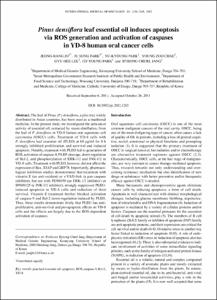KUMEL Repository
1. Journal Papers (연구논문)
1. School of Medicine (의과대학)
Dept. of Molecular Medicine (분자의학)
Pinus densiflora leaf essential oil induces apoptosis via ROS generation and activation of caspases in YD-8 human oral cancer cells
- Keimyung Author(s)
- Jang, Byeong Churl
- Department
- Dept. of Molecular Medicine (분자의학)
- Journal Title
- International Journal of Oncology
- Issued Date
- 2012
- Volume
- 40
- Issue
- 4
- Abstract
- . The leaf of Pinus (P.) densiflora, a pine tree widely distributed in Asian countries, has been used as a traditional medicine. In the present study, we investigated the anticancer activity of essential oil, extracted by steam distillation, from the leaf of P. densiflora in YD-8 human oral squamous cell carcinoma (OSCC) cells. Treatment of YD-8 cells with P. densiflora leaf essential oil (PLEO) at 60 μg/ml for 8 h strongly inhibited proliferation and survival and induced apoptosis. Notably, treatment with PLEO led to generation of ROS, activation of caspase-9, PARP cleavage, down-regulation of Bcl-2, and phosphorylation of ERK-1/2 and JNK-1/2 in YD-8 cells. Treatment with PLEO, however, did not affect the expression of Bax, XIAP and GRP78. Importantly, pharmacological inhibition studies demonstrated that treatment with vitamin E (an anti-oxidant) or z-VAD-fmk (a pan-caspase inhibitor), but not with PD98059 (an ERK-1/2 inhibitor) or SP600125 (a JNK-1/2 inhibitor), strongly suppressed PLEO-induced apoptosis in YD-8 cells and reduction of their survival. Vitamin E treatment further blocked activation of caspase-9 and Bcl-2 down-regulation induced by PLEO. Thus, these results demonstrate firstly that PLEO has anti-proliferative, anti-survival and pro-apoptotic effects on YD-8 cells and the effects are largely due to the ROS-dependent activation of caspases.
- Keimyung Author(s)(Kor)
- 장병철
- Publisher
- School of Medicine
- Citation
- JEONG-RANG JO et al. (2012). Pinus densiflora leaf essential oil induces apoptosis
via ROS generation and activation of caspases in YD-8 human oral cancer cells. International Journal of Oncology, 40(4), 1238–1245. doi: 10.3892/ijo.2011.1263
- Type
- Article
- ISSN
- 1019-6439
- Appears in Collections:
- 1. School of Medicine (의과대학) > Dept. of Molecular Medicine (분자의학)
- 파일 목록
-
-
Download
 oak-aaa-02263.pdf
기타 데이터 / 537.06 kB / Adobe PDF
oak-aaa-02263.pdf
기타 데이터 / 537.06 kB / Adobe PDF
-
Items in Repository are protected by copyright, with all rights reserved, unless otherwise indicated.